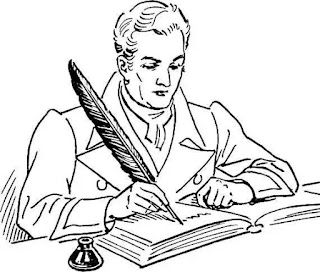Give a short account of the 20th Century poetic drama
The modern poetic drama evolved during the last decade of the 19th century and the first decade of the 20th c. as a reaction to the Realistic prose drama of Henrik Ibsen and Bernard Shaw. Isben adopted prose as the medium of dramatic communication. As he proclaimed, “My desire was to depict human beings and therefore I would not make them speak the language of the gods”. Bernard Shaw who is the greatest exponent of realistic drama made drama out of the social forces and conveyed his social and philosophical ideas through deves prose debates. In fact, Isben, Shaw, and Galsworthy were too realistic and too involved in contemporary social problems to be tolerant of any poetic expression.
By the 1930s prose plays in English appeared to have exhausted all their resources and, in the words of G.S. Fraser, reached a dead end. English drama simply did not possess the strength and ability to deal with the depth, tension, and complexity of contemporary life as the novel had done. Come playwrights in these conditions decided to revive poetic plays for the small specialized audience in what came to be. called little theatres. This is what Allardyce Nicoll in British drama calls, a “renaissance of imagination.” T.S. Eliot to whom goes the whole credit for the revival of modern poetic drama argues. “It is possible that what distinguishes poetic drama from prosaic drama is a kind of doubleness. in the action, as if it took place on two planes at once both symbolism and allegory being operations of the conscious planning mind.” Somerset Maugham points out in his Summing Up that it is an error of judgments that gives up the verse for the sake of modern realism. Abercrombie believes that prose drama is an aspect of materialistic culture. Poetic drama probes into the essence of life while prose drama touches on the externals of life. Poetry is the fillest medium for expressing the subtleties of thoughts, nuances of human emotions of the inwardness of feelings. T. S. Eliot further adds, “Poetry is the natural and complete medium of drama, that the prose play is a kind of abstraction capable of giving you only part of what the theatre can give, and that the verse play. capable of something much more intense and exciting.”
The short but brilliant revival of poetic drama was pioneered by T.S. Eliot, W.B Yeats, W.H. Auden, Christopher Isherwood, and Christopher Fry. They were followed and joined by other lesser writers to make an effective tradition.
T.S. Eliot has been the greatest shaping force in the renewal of modern poetic drama. His Murder in the Cathedral received singular success on the stage, and it remains the most successful poetic drama written during the 19th and 20th centuries. The play shows the playwright’s superior command of the poetic medium as well as of the dramatic skills. Besides, Eliot contributed to the English poetic drama The Family Reunion, The Cocktail Party, The confidential Clerk, and The Elder Statesman. Eliot’s poetic plays are quite complex, but they are satisfying in their poetry and the evocation of the desired moods by wonderful handling of the verse medium.
W.B. Yeats:
W.B Yeat’s verse plays have been called by T.S. Eliot; work of a lyrical dramatic. He began by using blank verse, and his early plays such as Green Helmet with its brilliant irregular rhyme reveals the genius of verse dramatists. Yeat’s developed blank verse to such an extent that it came to be recognized as typically Yeatsean, and another device which he used with great success it’s the “Lyrical” choral interlude. As in his uses, his verse plays to probe the mystique of human nature and quest for an answer to come deeper private questions.
Christopher Fry:
“Christopher Fry contributed quite a few plays to the English theatre, the better known of which are The Phoenix too Frequent, The Lady’s Not for Burning, and venus observed. The Phoenix too Frequent is replete with an abundant richness of fanciful detail’ forcefully eloquent in lyrical quality, highlighting the grief of a woman mourning her dead husband. Some critics feel that Fry’s play belongs to the tradition of prose comedies rather than the verse plays of Eliot and Yeats. His style and language, the dazzle of his words, completely overwhelm the audience. Fry presented a more philosophical theme in his remarkable play the Lady’s Not for Burning. Set in the back backdrop of the fifteenth century, it deals with a girl, Jennet’s young who is sentenced to death at the stake by fire for allegedly practicing witchcraft. The play many respects devoted Fry remarkable to the position of a first-rate play-wright.
W.H. Auden and Christopher Isherwood: The collaboration of W.H. Anden and Christopher Isherwood in producing such plays as Dog Beneath the Skin, Across the Frontier, and The Ascent of F6, has become historically famous. In these plays, Anden wrote verse portions while Asherwood composed prose dialogues. The virtuosity with the medium-fused prose and verse and cleverness with words is quite evident in their plays. Social issues are raised by the mythological background that easily overwhelms them.
Poetic drama, as can be expected, failed to establish in an age that gave greater importance to prose writings and offered all conditions suitable for their promotion and growth. The age of poetic drama had disappeared and no amount of its artificial revival could have brought it back to life. However, the poetic dement and lyrical vision continued to feed works of such playwrights as sean O’ Easey, Lady Gregory, J. M. Synge, Oscar Wilde, John Masefield, and others. Though written in prose their plays are characterized by a dominant poetic approach to issues concerning human relationships.
